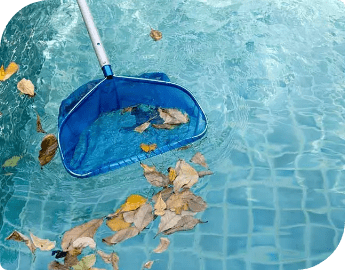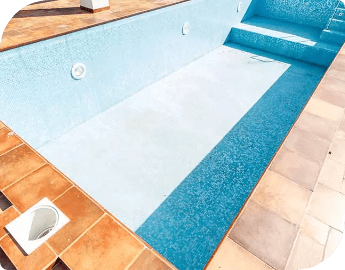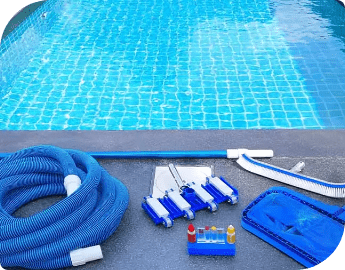Is pool cleaning worth it?
Yes, professional pool cleaning is definitely worth it. It ensures your swimming pool remains consistently clean and hygienic, which is crucial for safety and enjoyment. Regular cleaning by experts also helps preserve the value of your property, prevents issues caused by leaves, debris, and algae, and can save you time and effort compared to DIY attempts. Entrusting your pool to professionals provides peace of mind and sparkling results, allowing you to enjoy your pool whenever you desire.
How often should I clean my pool?
Algae and bacteria can easily settle in your pool due to their nature. To ensure it stays clean and hygienic, you should clean your pool at least once a week. To do so, brush and vacuum the walls and floor of your pool to remove any debris that the filter has missed.
Why is my pool cloudy?
Cloudy water can be an irritant to the eyes and is the result of poor filtration, contaminants in the water, improper chemical balance, or dead or living algae (there are over 20,000 types of algae!).
How often should my swimming pool be serviced?
It’s vital to maintain and service your swimming pool all year round. By correctly maintaining your pool throughout the year, you will ensure that the amount of staining is reduced. You should also take care to ensure that your pumps and other equipment are properly maintained to prolong their life. It’s a given that regular maintenance will save you money in the long run.
How often should a commercial pool be cleaned?
Commercial pools typically require more frequent cleaning and maintenance than residential pools due to higher usage, stricter health regulations, and larger volumes of water. The exact frequency depends on factors like bather load, local health codes, and the presence of features like splash pads. It's common for commercial pools to undergo daily cleaning tasks and require professional servicing several times a week or even daily, to ensure hygiene, optimal chemical balance, and equipment functionality, thereby ensuring smooth business operations and compliance.
How often should a pool be vacuumed?
For residential pools, it is generally recommended to vacuum the pool at least once a week to remove any debris that the filter might have missed and to keep the pool sparkling clean. Pools with heavy usage, surrounded by trees, or experiencing algae problems might benefit from more frequent vacuuming. Commercial pools, due to higher bather loads, often require daily vacuuming or continuous circulation from automated cleaners to maintain hygiene standards.
How often should pool tiles be cleaned?
Pool tiles should be cleaned regularly as part of routine pool maintenance to prevent the buildup of scum, algae, and mineral deposits. For most residential pools, scrubbing the waterline tiles once a week or every two weeks is a good practice. Professional services include brushing and vacuuming pool walls, which encompasses tile cleaning, ensuring thorough removal of debris. Commercial pools may require more frequent or specialized cleaning to maintain hygiene standards and appearance.
Are pool chemicals necessary?
Using pool chemicals is one way to keep the water balanced at neutral levels without high acidity or alkalinity. However, the wrong chemicals can cause your pool to get dirty faster. Furthermore, debris and other natural contaminants can cloud the water and create an environment where bacteria can thrive. Using the right chemicals in your pool is a must, but if you don’t know which ones to use, you should consider getting in touch with the professionals.
How often should a swimming pool be emptied?
A swimming pool should generally be emptied and refilled only every five to seven years, or even less frequently, unless there's a specific reason. Common reasons for draining include major repairs, resurfacing, or if the water's Total Dissolved Solids (TDS) levels become too high, making chemical balancing ineffective. For routine cleaning and maintenance, continuous filtration, brushing, vacuuming, and chemical balancing are sufficient, without the need for emptying.
How do you clean a pool that has been sitting for months?
Cleaning a pool that has been sitting for months and become very dirty requires a comprehensive professional approach. This typically involves removing large debris, vacuuming extensively, performing aggressive chemical treatments (like shocking), adjusting pH and alkalinity, and running the filtration system for extended periods. Our trained professionals have the expertise and equipment to tackle pools with excessive leaves, debris, and severe algae or cloudy water issues, restoring them to a clean and hygienic state ready for enjoyment.
How often should my swimming pool be serviced?
It’s vital to maintain and service your swimming pool all year round. By correctly maintaining your pool throughout the year, you will ensure that the amount of staining is reduced. You should also take care to ensure that your pumps and other equipment are properly maintained to prolong their life. It’s a given that regular maintenance will save you money in the long run.
How much does it cost to get a swimming pool cleaned?
The cost of getting a swimming pool professionally cleaned depends on several factors, including the pool's size and type (residential or commercial, above-ground or underground), its current condition (e.g., heavily soiled vs. routine clean), and the frequency of service. While specific pricing requires checking online availability, our service aims to keep costs down while offering competitive rates for professional care. A detailed assessment helps determine the precise cost for your specific pool cleaning needs.
How long should it take to clean a pool?
The time it takes to professionally clean a pool varies depending on its size, type, and current condition. A standard residential pool in good condition might take 1-2 hours for routine cleaning. However, a larger commercial pool or a residential pool that has been neglected for some time, accumulating significant leaves, debris, or algae, could take several hours for a thorough deep clean, as it might involve more intensive vacuuming, brushing, and filtration processes.
How often should a swimming pool be drained and fully cleaned?
A swimming pool typically does not need to be drained and fully cleaned very often, usually only every five to seven years, or when significant issues arise. This intensive process is usually reserved for situations requiring major repairs, such as resurfacing, crack repairs, or replacement of structural components. For regular maintenance, the pool is kept full, relying on continuous filtration, routine cleaning, and proper chemical balancing to maintain cleanliness and hygiene without the need for draining.




